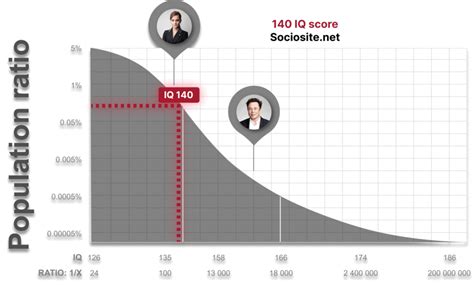Introduction
Intelligence quotient (IQ) is a measure of cognitive abilities, including reasoning, problem-solving, and memory. It is widely used to assess intellectual functioning and identify individuals with exceptional abilities. One such group is those with an IQ of 140 or higher, who are considered to be highly intelligent. This article aims to delve into the implications of having an IQ of 140, examining its characteristics, benefits, and challenges.

Understanding IQ Scores
IQ scores are calculated using standardized tests that assess various cognitive domains, such as verbal comprehension, perceptual reasoning, working memory, and processing speed. The average IQ score is 100, with most people falling within the range of 85 to 115. Scores above 130 are considered to be in the “gifted” range, while scores above 140 are exceptionally high.
Characteristics of Individuals with an IQ of 140
Individuals with an IQ of 140 typically display the following characteristics:
- Exceptional Cognitive Abilities: They possess an exceptional ability to learn, reason, and solve problems. They may excel in abstract thinking, complex problem-solving, and critical thinking.
- Strong Problem-Solving Skills: They have a knack for identifying and resolving complex problems, often using creative and innovative approaches. They can quickly analyze situations, identify patterns, and develop effective solutions.
- Excellent Memory and Knowledge Base: They have strong memories and can retain and recall a vast amount of information. They are often avid readers and have a wide-ranging knowledge base across various subjects.
- Exceptional Creative Potential: They possess a high level of creativity and imagination. They may excel in artistic pursuits, writing, music, or other creative endeavors.
Benefits of Having an IQ of 140
An IQ of 140 brings with it numerous benefits, including:
- Career Success: Individuals with high IQs often excel in academic and professional settings. They are more likely to pursue higher education, secure high-paying jobs, and achieve leadership positions.
- Enhanced Problem-Solving Abilities: Their exceptional problem-solving skills can be highly valuable in various fields, such as science, technology, medicine, and business. They can contribute to innovative solutions and drive progress.
- Increased Cognitive Flexibility: They exhibit a high level of cognitive flexibility, which enables them to adapt to changing environments and learn new skills quickly. This adaptability can help them succeed in various life domains.
- Improved Decision-Making: Their strong analytical and reasoning abilities allow them to make well-informed decisions, both personally and professionally.
Challenges Associated with an IQ of 140
Despite the numerous benefits, individuals with an IQ of 140 may also face certain challenges:
- Social Isolation: They may struggle to relate to peers with lower IQs, as their intellectual interests and conversations may differ significantly. This can lead to feelings of social isolation and loneliness.
- Perfectionism and High Expectations: Their high intellectual abilities can make them prone to perfectionism and high expectations for themselves and others. This can lead to stress and anxiety if they fail to meet these standards.
- Intense Emotions: They may experience intense emotions and a heightened sensitivity to the world around them. This can be both a source of passion and a potential challenge when managing emotions in certain situations.
Applications of High IQ in Various Fields
The exceptional cognitive abilities of individuals with an IQ of 140 can be applied in a wide range of fields, including:
- Science and Technology: They can make significant contributions to scientific research, technological advancements, and invention.
- Education and Research: They can excel as educators, researchers, and thought leaders, fostering advancements in knowledge and inspiring future generations.
- Business and Leadership: They can become successful entrepreneurs, executives, and leaders, driving innovation and shaping industries.
- Arts and Humanities: They can use their creativity and intellectual abilities to pursue careers in the arts, music, writing, or other creative endeavors.
Comparing Individuals with IQs of 130 and 140
Individuals with IQs of 130 and 140 share many similarities, such as their exceptional cognitive abilities and strong problem-solving skills. However, there are also some key differences:
| IQ Score | Characteristics | Benefits | Challenges |
|---|---|---|---|
| 130 | Gifted, strong intellectual abilities | Career success, enhanced problem-solving abilities, increased cognitive flexibility | Potential social isolation, perfectionism |
| 140 | Exceptionally high, exceptional cognitive abilities | Career success, enhanced problem-solving abilities, heightened creativity, improved decision-making | Social isolation, perfectionism, intense emotions |
Strategies for Nurturing High IQs
To nurture and develop high IQs, several strategies can be employed:
- Provide intellectually stimulating environments: Encourage reading, learning, and exposure to new ideas.
- Encourage exploration and curiosity: Foster a love of learning and encourage asking questions and investigating interests.
- Support and mentorship: Provide access to mentors and role models who can guide and inspire high-IQ individuals.
- Challenge and stretch: Offer challenging tasks and activities that stimulate growth and intellectual development.
Conclusion
An IQ of 140 is a significant indicator of exceptional cognitive abilities. Individuals with this IQ typically display exceptional problem-solving skills, strong memories, and high creative potential. While they benefit from enhanced career prospects and problem-solving abilities, they may also face challenges such as social isolation and perfectionism. By nurturing these abilities and providing appropriate support, high-IQ individuals can make valuable contributions to various fields and enhance society as a whole.
